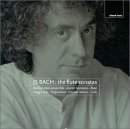|
|
Flute Sonatas BWV 1030-1039
Martin Feinstein (Flute) & Maggie Cole (Harpsichord)
Review: Flute Sonatas
|
C-2 |
J.S. Bach: The Flute Sonatas |

|
|
Partita in A minor BWV 1013 (for solo flute) [14:22]
Sonata in B minor BWV 1030 [18:04]
Sonata in A major BWV 1032 [12:26]
Sonata in E minor BWV 1034 [13:45]
Sonata in E major BWV 1035 [12:11] |
|
Martin Feinstein (Flute); Maggie Cole (Harpsichord); Nicholas Roberts (Cello) |
|
Black Box BBM |
Jun 2000 |
CD / TT: 70:57 |
|
Recorded at Potton Hall, Suffolk, England.
Review: Flute Sonatas
Buy this album at: Amazon.com |
|
Kirk McElhearn wrote (October 5, 2002):
Martin Feinstein takes a huge risk opening this recording with the solo flute partita BWV 1013. This is a very difficult work to play - not that the music itself calls for a virtuoso flautist, but, like Bach¹s solo works for violin or cello, it calls for the subtlest manner of infusing the right emotion into the music. One does not play this music, one must live it. Unfortunately, Feinstein does not give the impression that he is living the music; it sounds like he is merely playing the notes. Not only does he take long pauses to breath - pauses which are long enough to be disturbing he gives the music no soul. He plays the notes, he plays the melodies, but the music does not come to life.
The final movement of the work, the Bourrée Anglaise, is the only part where he seems to be in touch with the music. Even then, however, he lacks the real vitality to give this music the emotion it deserves.
Yet all this changes when the B minor sonata for flute and harpsichord begins. Alone, Feinstein seems to be battling with nature, but supported by the harpsichord - excellently played by Maggie Cole - he focuses himself much better. It is as if he needs the structure of the accompaniment to make this music sound good. While his tone is not always perfect - which is either a result of his flute or the recording itself; he sounds shrill at times - he gives the music a much better time in these pieces where he is accompanied. Unfortunately, the flute is a bit too present, and the harpsichord does not get to play its appropriate role.
Nicholas Roberts cello has a rich deep sound, and the two final sonatas for flute and continuo benefit from this, even though, as for the flute and harpsichord sonatas, the flute is too present. In the faster movements of these two sonatas, there is a nice interplay among the musicians, but this falls apart in the slow movements.
There is good and less good on this disc. While the solo flute partita is disappointing, the other works are well-played. The lack of balance among the instruments detracts from the music a bit, and the musicians do not always sound very tight. This is far from the best recording of these works, though better than many. |
| |
|
|
|